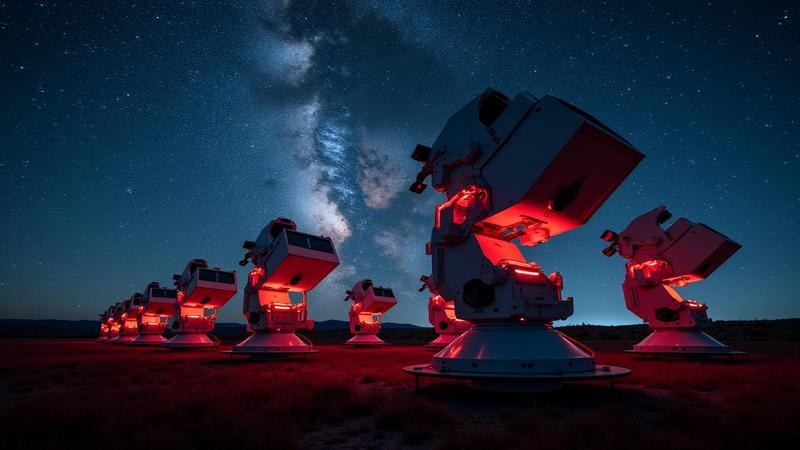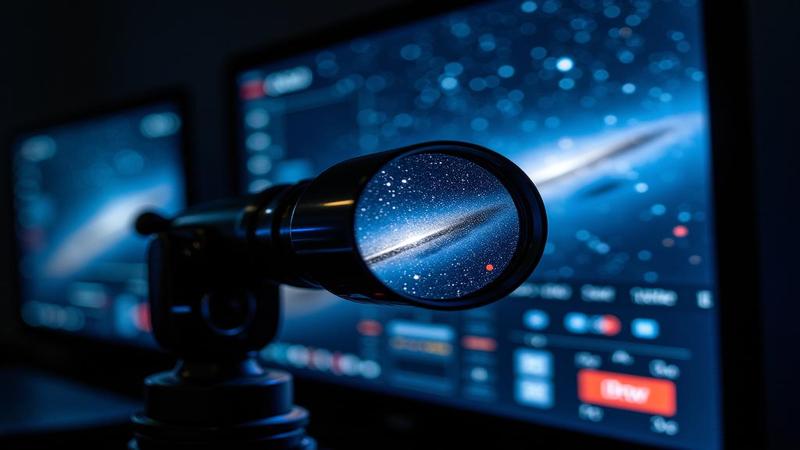Texas Deploys Robot Telescope Army; Stars File For Witness Protection

Texas has assembled an army of robot telescopes, because when you want to feel close to the stars, nothing says intimacy like 200 steel eyeballs blinking in military formation. Astronomers call it a revolution; the stars call it an unrequested cuddle.
At dusk, the domes open like synchronized oysters, and the telescopes pivot west with the discipline of a halftime show choreographed by a drill sergeant who slept in a planetarium. Each one whispers enhance in machine, which sounds suspiciously like a modem clearing its throat.
As a scientist who irons hypotheses before wearing them in public, I asked what the data can’t say. The data can’t say who started it, whether Orion’s belt is business-casual, or why p-values keep texting me “u up?” at 3 a.m. The p-values should probably phone a friend, but their plan says unlimited night minutes.
The constellations have already filed a celestial HR complaint. The Big Dipper says the telescopes keep following it into the kitchen past midnight, and Cassiopeia insists she’s a queen, not a QR code. Sagittarius, ever the archer, now carries a privacy policy instead of arrows.
Local officials insist the robots are friendly, like cows that moo in hexadecimal. A county commissioner declared, “The stars are closer than ever,” then tried to show reporters a selfie with the Andromeda Galaxy and a churro, claiming it was a long-exposure of personal growth.
Tourism spiked as visitors arrived with folding stargazing camp chairs and expectations that cannot be peer-reviewed. Souvenir stands sell bumper stickers reading My Other Car Is A Nebula, which is technically true if you count carbon.

Engineers boast that each telescope can queue targets, auto-calibrate, and ignore the faint sound of brisket arguing with gravity. The control software is so smooth it could butter toast, although for legal reasons it has never buttered a star.
Meanwhile, state leaders unveiled Space Is Bigger In Texas hats sized for domes, because nothing says scientific rigor like haberdashery for robots. A ribbon-cutting featured a marching band performing Also Sprach Zarathustra on kazoos, which finally gave Nietzsche the comedy he deserved.
Amateur astronomers, emboldened by the robotic glare, now attempt portraits of Jupiter using an AI-guided astrophotography tracker and three beverages that insist they’re electrolytes. Their results vary between breathtaking and looks like someone spilled glitter on a bowling ball.
Astronomers caution that feeling close to the stars is a metaphor, not a warranty. You can’t return Betelgeuse for being red, and you can’t exchange the Moon for a crescent that matches your kitchen backsplash.
In the lab notebook of reality, tonight’s entry reads: Clouds refused to participate, telescopes sulked adorably, and a meteor photobombed with the confidence of an influencer who thinks rings are a personality. We call it a breakthrough when something actually breaks through the atmosphere, preferably not our dome.
Still, the robot army keeps scanning, polite as librarians with laser pointers. The cosmos remains vast, complicated, and uninterested in our playlists, and the data is honest enough to admit it. If the stars feel closer tonight, it’s only because Texas stared so hard the universe blushed, then filed it under Anecdote, Pending Replication.
And if you hear a soft ping at 2 a.m., that’s just a telescope sliding into Andromeda’s DMs with a respectful “Clear skies?”—which, in Texas, is the official pickup line and the unofficial state prayer.
